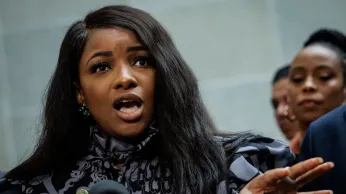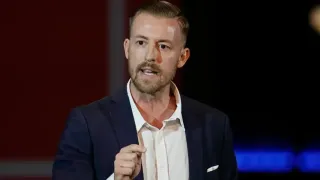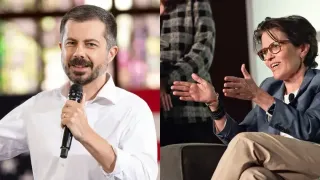
5 hours ago
Congressional Black Caucus Condemns Laura Loomer’s Recent Racist Attacks on Rep. Jasmine Crockett
READ TIME: 3 MIN.
Far-right activist Laura Loomer, a known ally of former President Donald Trump, has sparked national outrage after unleashing a barrage of racist and sexist insults against Texas Congresswoman Jasmine Crockett. During a widely shared online tirade earlier this week, Loomer referred to Rep. Crockett using a racist slur, calling her “ghetto” and using further derogatory language that many have described as both misogynistic and rooted in anti-Black stereotypes .
The incident quickly drew condemnation from a broad coalition of lawmakers, activists, and advocacy organizations. At the 54th Congressional Black Caucus (CBC) Annual Legislative Conference, CBC Chairwoman Yvette D. Clarke publicly denounced Loomer’s comments, describing them as part of a “concerted effort” to undermine and endanger Black members of Congress. Clarke stated, “It hurts my heart that we have ghetto Black b—–s who hate America serving in Congress,” quoting Loomer’s offensive post to highlight the severity of the attack before vowing that the CBC would “respond appropriately” .
Loomer’s attacks emerged shortly after Rep. Crockett criticized white Democrats for voting to honor a controversial figure known for inflammatory statements about Black Americans and diversity, equity, and inclusion (DEI) initiatives. The timing of the incident—coming as debates over DEI and civil rights protections intensify—has amplified concerns over the safety of marginalized lawmakers and the impact of targeted harassment on democratic institutions .
Chairwoman Clarke connected Loomer’s remarks to broader efforts aimed at rolling back hard-won civil rights protections and DEI policies. “The administration has made it clear that it’s open season on Black people,” Clarke said, referencing both federal and state initiatives that have sought to dismantle inclusion efforts . She continued, “Whether it’s…purging the nation of diversity, equity and inclusion, or whether it is just what has happened in terms of the implosion of the federal enterprise and the impact that it has had on Black families across the United States, these folks know exactly what they’re doing.”
The intersection of racism, misogyny, and political harassment has not gone unnoticed by LGBTQ+ and allied organizations. Many advocates have pointed out that attacks on Black women in Congress often mirror the rhetoric and tactics used to undermine LGBTQ+ and transgender lawmakers and candidates. Such incidents expose the compounded vulnerabilities faced by individuals at the intersection of multiple marginalized identities, including those who are both Black and LGBTQ+.
Leaders from LGBTQ+ advocacy groups have called for broad, intersectional solidarity in the face of escalating political violence and hate speech. They emphasize that attacks on Black women, including Rep. Crockett, are deeply entwined with ongoing efforts to delegitimize and silence LGBTQ+ voices—especially as both groups are frequently targeted by far-right activists and hostile media campaigns .
The environment of heightened political hostility has led to renewed demands for accountability from social media platforms, political leaders, and law enforcement. Advocates urge Congress and the Biden administration to ensure that all lawmakers—regardless of race, gender, or sexual orientation—can serve without fear of harassment or violence.
In response to Loomer’s attacks, the Congressional Black Caucus has pledged to “push back” and defend its members from hate speech and harassment. “This is a concerted effort, and she’s just part of the power,” Clarke said, calling out the amplification of racist rhetoric for political and financial gain. She noted that such attacks occur “at a time when there’s an escalation of political violence,” and criticized those who call for civility while engaging in inflammatory rhetoric themselves .
Clarke further highlighted the need for the CBC to remain focused on advancing policies that protect civil rights and promote inclusion, even as they respond to personal attacks. “A lot of what our colleagues are doing is so that they can get clips, they can get likes, they can get money from the election, and they’re unfortunately using CBC members and those who they believe are vulnerable to do just that,” she said .
Advocacy groups have echoed these sentiments and stressed the importance of community resilience. Many have called on LGBTQ+ and allied communities to show solidarity with Rep. Crockett and other targets of hate, as well as to remain vigilant against rising threats to equality and safety.
The recent attacks on Rep. Jasmine Crockett by Laura Loomer have underscored the persistent dangers faced by Black women and LGBTQ+ lawmakers in the current political climate. As national debates over inclusion and civil rights intensify, leading voices across the spectrum are calling for a unified response against hate speech and political violence. Through solidarity, public accountability, and continued advocacy, marginalized communities seek to defend the progress achieved and push for a more inclusive future for all.






